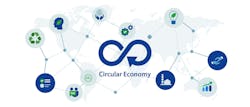PNNL issues RFIs on DC-powered SSL and building microgrids
Pacific Northwest National Laboratory (PNNL) has launched dual request for information (RFI) initiatives intended to support US Department of Energy (DOE) activities in the area of even-more-efficient LED lighting along with more-efficient buildings. One RFI is focused on solid-state lighting (SSL) products that can be directly powered by DC sources. The second RFI is focused on building microgrid technology where renewable sources such as solar and wind directly power building loads such as lighting.
The idea of DC-powered, LED-based lighting has lurked for a long time as a way to incrementally improve energy efficiency. We have covered the concept numerous times including in a feature way back in 2014 where the eMerge Alliance standard was applied in some projects. Converting AC to DC once rather than in every AC-powered luminaire can reduce energy loss associated with the conversion and also save costs in wiring, labor, and more. More recently, Power over Ethernet (PoE) has become a popular DC-distribution scheme.
A DC grid in a building is also more amenable to power produced by renewable sources such as solar and wind, including when that power is stored in batteries. All of the above output DC, which in most buildings today is typically converted to AC and then back to DC in, say, an LED luminaire or in an IT device. Multiple series conversions incur even more losses.
PNNL wants to gather information from manufacturers of both the DC-powered lighting in the market and of products and systems in the market that enable direct DC power to building loads including lighting. The lab has placed the RFIs online. Each is somewhat akin to completing an online survey with the DC lighting RFI having 20 questions and the microgrid RFI having 17. In both cases, the RFIs are asking for descriptions of products and systems and ultimately for either web links to product data sheets or for direct upload of such data.
Complete RFIs are being requested by May 21. The PNNL has estimated that completing one of the RFIs should take about one hour. The lab will host an informational webinar on this initiative next week on April 30 at 1:00 PM Eastern time. You can register for the webinar on the same page that hosts the RFI links.
Microgrids are a very compelling technology that we have been following but that we have written little about. A building can operate solely from the microgrid when sufficient renewable or stored power is available. The systems also have the ability to swap to the AC grid when necessary, with the system converting that utility-supplied AC to DC to feed the building microgrid. The technology could be a key tool in evolving Zero Energy Buildings. We will publish an article looking at the microgrid technology in a coming issue and we look forward to hearing more about what PNNL learns via its RFI process.
For up-to-the-minute LED and SSL updates, why not follow us on Twitter? You’ll find curated content and commentary, as well as information on industry events, webcasts, and surveys on our LinkedIn Company Page and our Facebook page.

Maury Wright | Editor in Chief
Maury Wright is an electronics engineer turned technology journalist, who has focused specifically on the LED & Lighting industry for the past decade. Wright first wrote for LEDs Magazine as a contractor in 2010, and took over as Editor-in-Chief in 2012. He has broad experience in technology areas ranging from microprocessors to digital media to wireless networks that he gained over 30 years in the trade press. Wright has experience running global editorial operations, such as during his tenure as worldwide editorial director of EDN Magazine, and has been instrumental in launching publication websites going back to the earliest days of the Internet. Wright has won numerous industry awards, including multiple ASBPE national awards for B2B journalism excellence, and has received finalist recognition for LEDs Magazine in the FOLIO Eddie Awards. He received a BS in electrical engineering from Auburn University.




![The DesignLights Consortium continues to make progress in shifting outdoor lighting products and implementation practices toward a more restrained and thoughtful strategy. [Image does not represent a DLC qualified fixture.] The DesignLights Consortium continues to make progress in shifting outdoor lighting products and implementation practices toward a more restrained and thoughtful strategy. [Image does not represent a DLC qualified fixture.]](https://img.ledsmagazine.com/files/base/ebm/leds/image/2024/08/66be810888ae93f656446f61-dreamstime_m_265700653.png?auto=format,compress&fit=&q=45&h=139&height=139&w=250&width=250)
